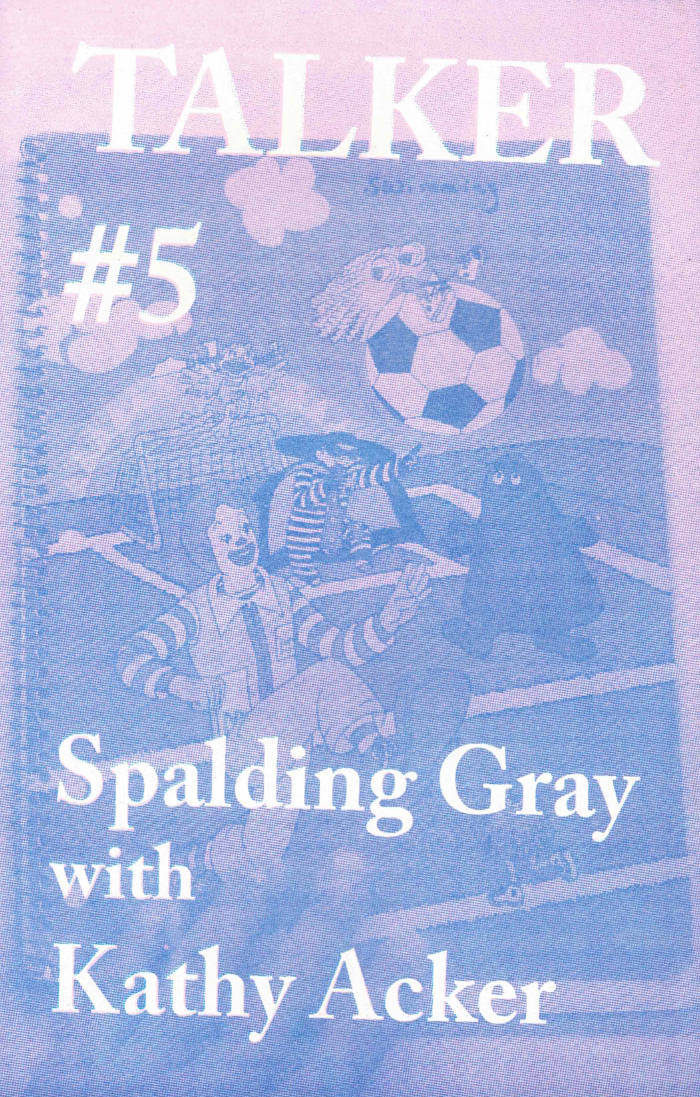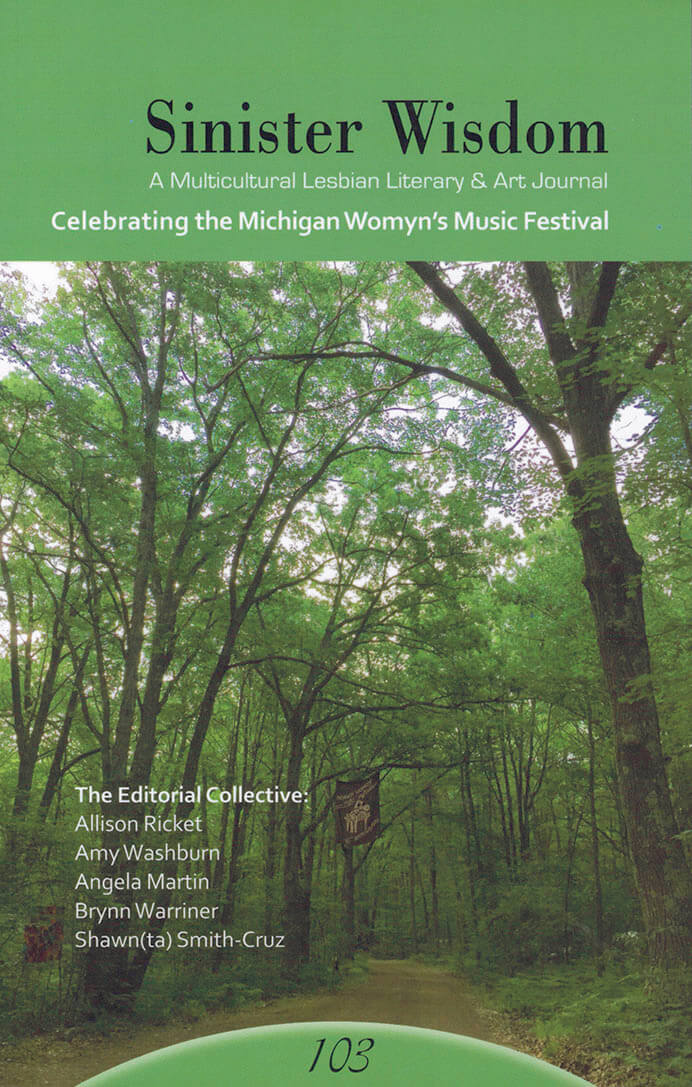Books: english
Books: english
in random order

TALKER issue #5 — Spalding Gray with Kathy Acker
Talker is an interview zine about performance.
This is Issue #5. It is a transcript of an event hosted by the writer Kathy Acker at the ICA, London in February 1987 in which the performer Spalding Gray discussed his work.
A founding member of the Wooster Group, Spalding Gray gained fame for his autobiographical monologue performances. At the time of this conversation, he had just completed filming Jonathan Demme’s movie adaptation of his work Swimming to Cambodia, a performance in which he describes experiences surrounding a trip to Southeast Asia to play a small role in the film The Killing Fields (1984). In this dialogue with Acker, Gray focuses on the process of developing work and compares his experience of writing with making live performance.
The event was part of the ICA’s IN CONVERSATION series which paired up writers to talk about their practices.

On Feminist Films
This collection of essays celebrates the work of international feminist filmmakers from the 1950s to the present. Featuring contributions from leading scholars, filmmakers, essayists and activists, On Feminist Films is the second volume in the South London Cultural Review series. Contributors include: Stuart Bell, Catherine Grant, So Mayer, Louisa Wei, Emma Wilson.

One Shape of the Language: Cyrillic Archives
‘One Shape of the Language: Cyrillic Archives’ is an artist’s book documenting Inna Kochkina’s research into the history, style, and politics of traditional Cyrillic.
This research was born from Kochkina’s self-reflective curiosity about the relationship between cultural heritage and typography and evolved into an examination of the socio-political role of traditional Cyrillic. An ancient script, Cyrillic has been used to express various forms of cultural and territorial domination and continues to serve as an imperialist tool, having long been deployed in support of Slavic nationalism both in Russia and in the former USSR territories.
This publication is the result of Kochkina’s own research into and engagement with archives of typography, as well as conversations with anti-colonial activists, artists, and historians who interrogate traditional Cyrillic and its relationship to colonial power.
Alongside conducting scholarly research, Kochkina also produced drawings in response to archives of traditional Cyrillic. Making these drawings constituted a form of “studying by making.” With these efforts she has sought to construct an anti-colonial feminist narrative, employing both typographic artifacts and ‘patriarchal’ letterforms.
To make her drawings, Kochkina took samples from these low quality typographic archives, enlarging and transforming them into unexpected graphic shapes that were then recorded in a series of experimental prints. The drawing, collating and contact printing process that she followed allowed her to document and reveal the qualities lent to historical artifacts by digital noise. Through this working method she sought to rethink both the subject of her work as well as traditional approaches to type design practice. This book presents the prints in a roughly chronological sequence, poetically portraying Kochkina’s complex relationship with her native script. Variously precise, messy, and destructive, these works ultimately convey a series of “imaginary” shapes through which to reinterpret traditional Cyrillic of the past and present.

The Letters of Audre Lorde and Pat Parker 1974-1989
Poets Audre Lorde and Pat Parker first met in 1969; they began exchanging letters regularly five years later. Over the next fifteen years, Lorde and Parker shared ideas, advice, and confidence through the mail. They sent each other handwritten and typewritten letters and postcards often with inserted items including articles, money, and videotapes.
The Letters of Audre Lorde and Pat Parker 1974-1989 gathers this unique correspondence in which Lorde and Parker discuss their work as writers as well as the intimate details of their lives, including periods when each lived with cancer. These letters are a rare opportunity to glimpse inside the minds and friendship of two great twentieth century poets.
Introduction by Mecca Jamilah Sullivan.

Solitary Pleasure: Selected Poems, Journals and Ephemera
Solitary Pleasure is a new collection of poetry, journal entries, letters and ephemera by the American poet John Wieners, edited by Richard Porter with an introduction by Nat Raha.
John Wieners (1934-2002) was a poet, a Black Mountain College alumnus and an antiwar, gay rights & mental health activist.
‘John Wieners has been described as both ‘the greatest poet of emotion’ (by Robert Creeley) and ‘the poet laureate of gay liberation’ (within the Gay Liberation press). Solitary Pleasure delivers us this poet raw with mid-century queer feelings. Here, we encounter a writer preoccupied with the power and magic of poetics to profoundly render love, loss and survival in the face of destruction.’
— Nat Raha, from the introduction
'Solitary Pleasure is a selected collection of Wieners’ poems, appended with letters and journal entries. An introduction, written by contemporary poet Nat Raha, makes a powerful case for reading Wieners’ work as art born from “the heart of struggle”. The poems themselves are offhand and diaristic. Sometimes, they deploy childlike rhymes that purposely steer close to nonsense, successfully generating a sense of wonder (“If I had a canoe / I’d fill it with you / Then what would you do”). The Wieners of Solitary Pleasure is a poet eager to vocalise queer desire. “The beauty of men never disappears,” he writes, later portraying desire as something that must be “choked” out of him. Occupying nearly a third of Solitary Pleasure are his “Asylum Poems”, which Wieners wrote in 1969 – the summer of the Stonewall riots – while in a psychiatric institution. These poems spotlight the connection between art and affliction, but challenge us to consider creative expression as a very real mode of survival and salvation, and not merely, as current wellness discourses suggest, a potential curative or preventive to mental ill-health.'
— Ralf Webb for The Guardian

Welcome to the Shitshow
“There are three sides to every story: your side, my side, and the truth. Yet, whatever happened at the Shitshow holds six truths.” Welcome to the Shitshow with Casper Boone was launched on Friday, December 2nd at KBK Brussels. We celebrated the birth of our inaugural publication, allied with an exhibition with works by Casper.

Feminine Hijinx
Already a member of The Feminist Writers’ Guild and one of the principal founders/proponents of the New Narrative movement, Dodie Bellamy published her first book with Hanuman Books in 1991. Feminine Hijinx brings together two long pieces, "Complicity" and "The Debbies I Have Known", along with a new introduction by the author, written for this reissue.
Dodie Bellamy (b. 1951) is an American writer, journalist, and educator, most often associated with the New Narrative movement. She is the author of The Letters of Mina Harker, Cunt-ups, Pink Steam, The TV Sutras, and co-edited Writers Who Love Too Much: New Narrative Writing 1977–1997 with Kevin Killian.

Poetry, or else...
The poet, the unknown being… a loony, a dreamer, a hermit. The poet writes poetry… but really, what is poetry? Arts, politics, mere amusement?
This little book is an insight into the mindset of someone who just can’t help but to be a poet. It is a manifesto for the freedom of thought and expression, an essential source of motivation and inspiration for readers and writers alike.
Anisur Rahman (b.1978) made his poetic debut in 2003. As a journalist, translator and playwright he has further contemplated the poetic mind. Born in Bangladesh, he writes in both Bengali and English, but nowadays lives exiled in Sweden.

Index of Operational and Code Names
Le titre du livre « Index of operational and code names » reprend l'intitulé d'un document trouvé sur Internet constitué d'une liste de 437 mots anglais classés par ordre alphabétique et accompagnés de brèves indications concernant les opérations militaires pour lesquelles ces mots ont servi de noms de code.
Ce document a inspiré à Diane Guyot la série « Index War » réalisée selon un protocole simple consistant à produire un dessin pour chaque mot de la liste.
Composé de 86 dessins issus de cette série, certains reproduits pour le support du livre, d'autres présentés au sein d'un cahier photographique tels qu'ils sont aujourd'hui accrochés dans les intérieurs de leurs propriétaires, et d'une partie textuelle placée en fin de volume qui restitue l'intégralité du document source, le livre, comme le suggère la mention volume 1 qui accompagne son titre, ne marque pas le point d'achèvement de l'œuvre mais témoigne au contraire d'un processus en cours.
L'articulation des composantes de l'œuvre dans l'espace du livre en constitue en mème temps une nouvelle version, à la fois spécifique et autonome. L'activation du dispositif codex/index invite le lecteur à une méditation sur la notion de code, où s'entrecroisent sémiotique de l'image, technique de propagande et technologie de l'information.

Celebrating the Michigan Womyn's Music Festival
Sinister Wisdom 103: Celebrating the Michigan Womyn's Music Festival honors the forty-year legacy of the Michigan Womyn’s Music Festival (1976–2015). Sinister Wisdom 103: Celebrating the Michigan Womyn's Music Festival celebrates this embodiment of radical feminist separatist collaboration, transformational self-defined autonomous spaces, a commitment to sisterhood and matriarchal culture, and a musical city sprung from the earth for one week in the woods.
A collective of five womyn each with a deep connection to Fest operated by consensus to create this issue. Striving to represent a range of womyn’s voices, values, traditions, and experiences of Fest, the collective highlighted what Fest has meant to generations of womyn, documented its chronology, and bore witness to the power of this community. Sinister Wisdom 103: Celebrating the Michigan Womyn's Music Festival includes womyn from multiple races, geographies, sexualities, generations, and gender and other social identities. Just as Fest brought together womyn from various backgrounds, our collection includes a range of artistic experience, from seasoned authors and photographers to those womyn new to publishing.
Sinister Wisdom 103: Celebrating the Michigan Womyn's Music Festival remembers the transformations, possibilities, and hopes for spaces cultivating the ongoing empowerment of womyn.
.jpg)
Charismatic Spirals
Charismatic Spirals is for an America circa 2024, where poetry—the art of developing new means of speaking—has never been of such artistic, technological and political consequences.
An archetypal outsider, Will Alexander released his first poetry collection aged forty-four while working at the Los Angeles Lakers' ticket office. Three decades on, he has ascended to the legendary status of the city's great living surrealist, existing, as Eliot Weinberger wrote, in a state of "imaginal hyperdrive," with forty such collections to his name.
Operating at the edge of language, Alexander deploys words in a way that feels prophetic—human psyches synthesize with technological artifacts; atoms and archetypes collide; bodies are vacated, voices are newly incarnated. His America—like Glissant's—is multinational and—like Coover and Spiegelman's—multivalent and symbolically unstable. That is to say, he belongs to an America circa 2024, where poetry—the art of developing new means of speaking—has never been of such artistic, technological, and political consequence.
In doing so, Alexander draws from a vast array of influences, from luminaries like Aimé Césaire, Bob Kaufman, Andre Breton, Antonin Artaud, and Philip Lamantia, to holistic visions such as Sri Aurobindo's Integral Yoga, the Mayan numerical system, and Cheikh Anta Diop's perspectives on ancient Egypt. In a preview of Charismatic Spirals in the New York Times, Anne Boyer captured the essence of his work: "visionary poetry [that] achieves its effect through sound, not image...Cadence [that] can shatter us, set the world ablaze."
Read it syllabically, surf it quickly—there is no single way to approach this work.
Will Alexander (born 1948 in Los Angeles) is an African-American artist, philosopher, poet, novelist, essayist and pianist.